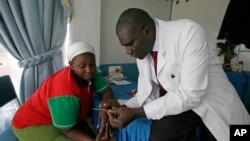NAIROBI —
A new report from Kenya’s ministry of health reveals 465,000 women had abortions last year, the vast majority in unsafe conditions -- despite more liberal abortion laws.
According to this week's report, Kenya’s national abortion rate, at 48 abortions for every 1,000 women, is higher than almost every other country in Africa.
Most of the procedures have taken place in unsafe conditions, either outside of medical facilities or without the assistance of trained professionals.
As a result, some 120,000 women sought medical treatment for complications from abortions.
Dr. Elizabeth Kimani, with the African Population and Health Research Center, says despite the safety concerns, there is a resistance in Kenya to addressing the problem.
“I think there’s still a lot of stigma about reproductive health and about abortion."
Kenya relaxed its abortion laws in the 2010 constitution by giving health professionals more leeway to determine when abortion is permitted. Before then, three doctors had to sign off on the procedure when it was necessary to save the life of the mother.
Because of continued resistance to abortion, the country has not brought health care facilities up to speed, said Kimani.
“Since it was quite restricted before 2010, there are no good structures which have yet been established even after the promulgation, in terms of training health care professionals, in terms of safe abortion care," she said.
A report released last year by the Kenya National Commission on Human Rights found unsafe abortions caused up to 50 percent of maternal deaths in Kenya. It said some of the unsafe methods women were using to terminate pregnancies included taking traditional herbs or high doses of anti-malarial medication.
Others inserted objects, like knitting needles, into their bodies. To get to the root of the problem, Kenya should devote more resources into family planning, Kimani said.
“Because people have unintended pregnancies first, and then they seek abortions. So we actually have to deal with this issue first.”
Dr. Kimani says the research found that 43 percent of pregnancies in Kenya are unintended. The report concludes that increasing access to contraceptives and other reproductive health services is key to preventing unsafe abortions.
According to this week's report, Kenya’s national abortion rate, at 48 abortions for every 1,000 women, is higher than almost every other country in Africa.
Most of the procedures have taken place in unsafe conditions, either outside of medical facilities or without the assistance of trained professionals.
As a result, some 120,000 women sought medical treatment for complications from abortions.
Dr. Elizabeth Kimani, with the African Population and Health Research Center, says despite the safety concerns, there is a resistance in Kenya to addressing the problem.
“I think there’s still a lot of stigma about reproductive health and about abortion."
Kenya relaxed its abortion laws in the 2010 constitution by giving health professionals more leeway to determine when abortion is permitted. Before then, three doctors had to sign off on the procedure when it was necessary to save the life of the mother.
Because of continued resistance to abortion, the country has not brought health care facilities up to speed, said Kimani.
“Since it was quite restricted before 2010, there are no good structures which have yet been established even after the promulgation, in terms of training health care professionals, in terms of safe abortion care," she said.
A report released last year by the Kenya National Commission on Human Rights found unsafe abortions caused up to 50 percent of maternal deaths in Kenya. It said some of the unsafe methods women were using to terminate pregnancies included taking traditional herbs or high doses of anti-malarial medication.
Others inserted objects, like knitting needles, into their bodies. To get to the root of the problem, Kenya should devote more resources into family planning, Kimani said.
“Because people have unintended pregnancies first, and then they seek abortions. So we actually have to deal with this issue first.”
Dr. Kimani says the research found that 43 percent of pregnancies in Kenya are unintended. The report concludes that increasing access to contraceptives and other reproductive health services is key to preventing unsafe abortions.




